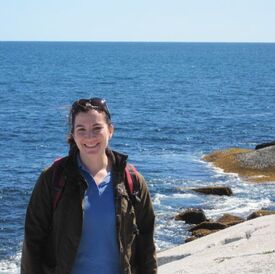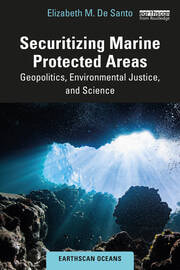
Elizabeth De Santo is Associate Professor and Chair of the Environmental Studies Program at Franklin & Marshall College, based in the Department of Earth and Environment. She is an environmental policy and governance scholar focused in coastal and marine environmental management. Her interdisciplinary academic background brings together human geography and environmental law (PhD, University College London), international relations (MSc, London School of Economics and Political Science), coastal environmental management (MEM, Duke University), and marine zoology (BA Hons., Connecticut College). Elizabeth's teaching and research critically examine: (1) the efficacy and equity implications of spatial approaches to conserving marine species and habitats (e.g., Marine Protected Areas and Marine Spatial Planning), and (2) mechanisms for improving the science-policy interface in environmental decision-making.
Prior to joining F&M, Elizabeth taught in the Marine Affairs Program and College of Sustainability at Dalhousie University in Halifax, Nova Scotia, Canada. She has also held positions with the IUCN (International Union for Conservation of Nature) and the World Environment Center, consultancies with the Office of the Auditor General of Canada and the Institute for European Environmental Policy, and she is a member of the IUCN World Commission on Environmental Law. She is on the Editorial Board of Marine Policy and the Editorial Advisory Board of the Journal of International Wildlife Law and Policy.
Click on the links at the top of this page to learn more about her research and teaching and to find links to her publications.
Citations are available here: Google Scholar Profile
Prior to joining F&M, Elizabeth taught in the Marine Affairs Program and College of Sustainability at Dalhousie University in Halifax, Nova Scotia, Canada. She has also held positions with the IUCN (International Union for Conservation of Nature) and the World Environment Center, consultancies with the Office of the Auditor General of Canada and the Institute for European Environmental Policy, and she is a member of the IUCN World Commission on Environmental Law. She is on the Editorial Board of Marine Policy and the Editorial Advisory Board of the Journal of International Wildlife Law and Policy.
Click on the links at the top of this page to learn more about her research and teaching and to find links to her publications.
Citations are available here: Google Scholar Profile
Latest News:

COMING SOON - new book with Routledge Earthscan Oceans series: Securitizing Marine Protected Areas: Geopolitics, Environmental Justice, and Science, available for pre-order in June 2024 (link to publisher website).
The book argues that Marine Protected Areas (MPAs) are not only a critical tool for protecting marine biodiversity in a changing climate, but they also play an important role at the intersection of geopolitics and environmental justice, and they provide a case study of environmental governance at the science-policy interface. The book takes an interdisciplinary and critical approach and builds on the author's two decades working in this field. By applying the three lenses of geopolitics, environmental justice and science, this book provides key insights to help the international community moving past 2030 and beyond, towards a future of meaningful, equitable, and effective conservation approaches.
The book argues that Marine Protected Areas (MPAs) are not only a critical tool for protecting marine biodiversity in a changing climate, but they also play an important role at the intersection of geopolitics and environmental justice, and they provide a case study of environmental governance at the science-policy interface. The book takes an interdisciplinary and critical approach and builds on the author's two decades working in this field. By applying the three lenses of geopolitics, environmental justice and science, this book provides key insights to help the international community moving past 2030 and beyond, towards a future of meaningful, equitable, and effective conservation approaches.
15 October 2023 - Opinion piece published in The Hill:
Reducing carbon emissions can't come at the expense of our oceans
We face a consequential choice: Will we finally protect the unique and fragile organisms found in the largest and least disturbed ecosystem on Earth? Or, in an attempt to curb the damage already caused by fossil fuels, will we destroy these species and habitats they depend upon before we have even discovered them?
|
For additional updates, see the news/media page.
|